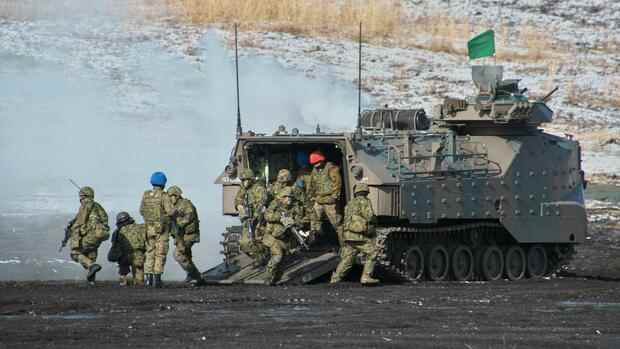Tokyo With the Ukraine war, Japan’s Defense Minister Nobuo Kishi gained a new role model: Germany. Earlier this week, in an interview with Japan’s Kyodo news agency, he announced he would seek a “dramatic” increase in the defense budget for 2023 to counter China’s expansion efforts and North Korea’s nuclear weapons program.
Kishi did not name specific budget targets and time frames. But his demand underscores the extent to which the Ukraine war is accelerating an armament spiral between China and other countries in Asia. US ally South Korea has been increasing its military budget faster than America’s key ally Japan for years and could even overtake its larger neighbor.
>> Also read here: “Escalate to win” – experts fear a new nuclear arms race
Top jobs of the day
Find the best jobs now and
be notified by email.
Taiwan is also discussing extending conscription, increasing missile production and buying more weapons from the US to deter China from invading. And Japan’s quasi-ally Australia, which formed a military alliance with the United States and Great Britain last year, is bringing forward the purchase of fighter jets and missiles by three years to 2024.
It is about increasing the deterrence of potential adversaries, said Australian Defense Minister Peter Dutton this week on the TV channel Seven Network. So far, it has been assumed that a Chinese attack on Taiwan could take place in the 2040s. “I think that time frame has now reduced dramatically.”
Japan becomes the symbol of Asia’s armament spiral
The fact that even Japan is giving up its military restraint is the clearest sign of a turning point in security policy in Asia. As a result of the casualties suffered in World War II and as a lesson learned from the Japanese conquest, Japan’s constitution to this day prohibits activities with the potential for war.
Japan rearmed in the past and founded the “Self-Defense Forces”. For decades, however, Japan remained true to its self-imposed rule of spending no more than one percent of its gross domestic product on defense so as not to frighten its neighbors.
>> Also read here: 100 billion euros for the Bundeswehr: FDP outlines its plans for the special fund
The current government has now abandoned this cap. Concerns about China’s rearmament are growing as its neighbor asserts ever more aggressive claims to the rocky islands controlled by Japan and is clearly threatening to militarily unite Taiwan with the Middle Kingdom.
Nevertheless, Japan’s Prime Minister Fumio Kishida increased the defense budget for the current year by only 1.1 percent to 5.4 trillion yen (40 billion euros). Depending on the exchange rate, Japan has the seventh or eighth largest defense budget, well behind Germany. With his Corona aid program, Kishida donated a few more billion euros.
The fear of the return of empires
But that’s not enough for former top diplomat Kunihiko Miyake, director at the Canon Institute for Global Studies (CIGS). “Tokyo is waking up now, but not as much as Germany,” said Miyake. Japan’s situation is much more risky for him. Miyake expects less of a systemic conflict between democracies and dictatorships. “It’s much more complicated,” Miyake said at a CIGS webinar this week, “the rivalry of the former empires USA, Russia, China, Turkey and maybe Iran will return.”
This means that the challenge in East Asia is greater than in Europe, says Miyake. “Germany only has one imperial power to worry about, Japan has two neighboring powers” – China to the west and south, and Russia, which controls two Japanese-claimed Kuril Islands, to the north.
Defense Minister Kishi, as a security policy hardliner, is therefore trying to determine the discussion about the new budget at an early stage. And not without reason: In view of the high national debt and the globally rising interest rates, the distribution battle is intensifying. Because the government also has to finance the rapidly growing army of pensioners with a generally shrinking population, securing the supply chains, an energy transition and climate protection measures. The double price surge caused by the corona crisis and the Ukraine war also calls for further economic stimulus.
However, the debate about realigning Japan’s security strategy is unstoppable. The acquisition of weapon systems with which Japan can attack enemy military bases is on the agenda anyway. In addition, Kishi’s biological brother, former Prime Minister Shinzo Abe, has already brought up military support for Taiwan and the stationing of American nuclear weapons in Japan.
More: Ministry of Geopolitical Risks – What the world can learn from Japan
